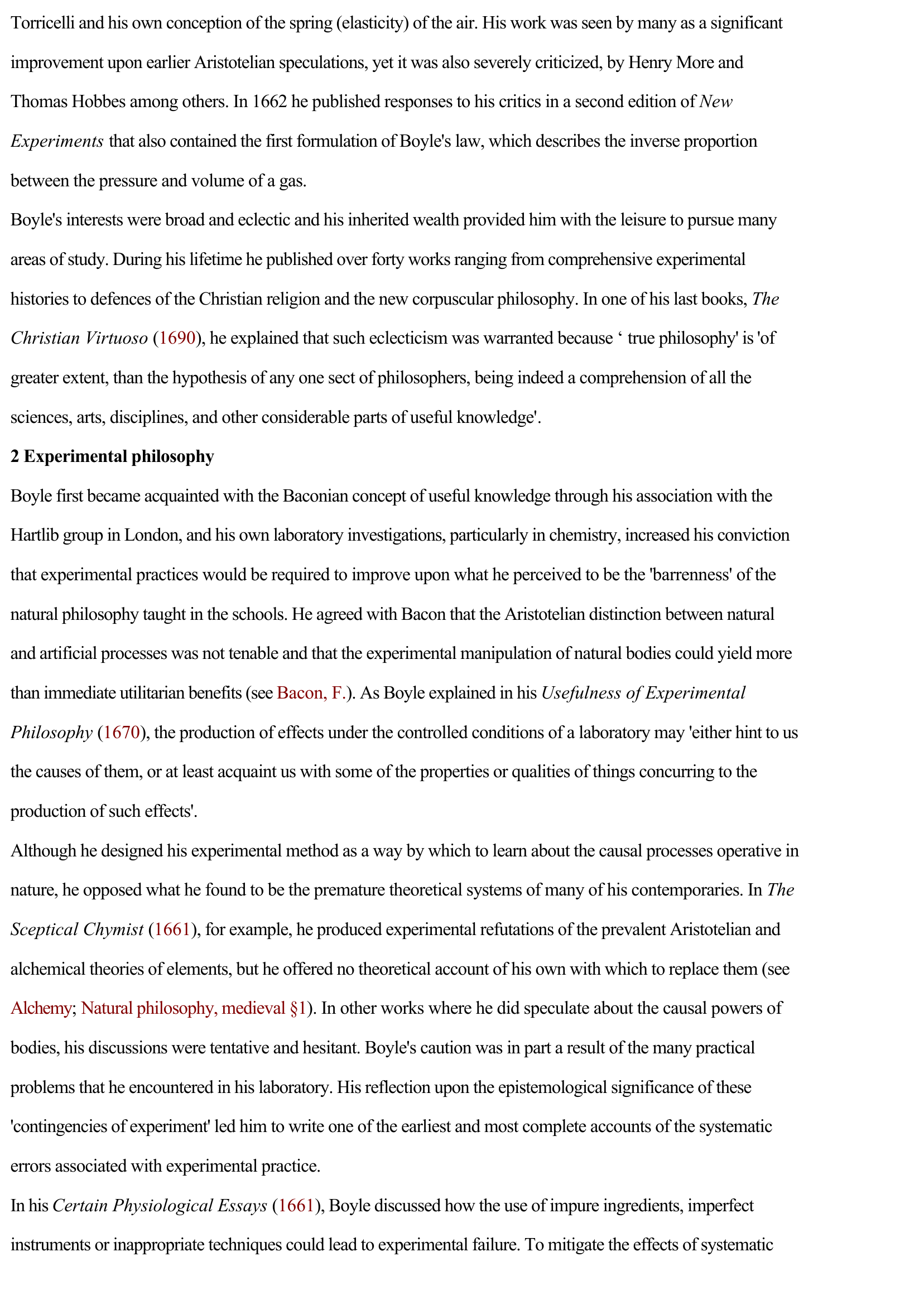Boyle, Robert
Publié le 22/02/2012

Extrait du document
«
Torricelli and his own conception of the spring (elasticity) of the air.
His work was seen by many as a significant
improvement upon earlier Aristotelian speculations, yet it was also severely criticized, by Henry More and
Thomas Hobbes among others.
In 1662 he published responses to his critics in a second edition of New
Experiments that also contained the first formulation of Boyle's law, which describes the inverse proportion
between the pressure and volume of a gas.
Boyle's interests were broad and eclectic and his inherited wealth provided him with the leisure to pursue many
areas of study.
During his lifetime he published over forty works ranging from comprehensive experimental
histories to defences of the Christian religion and the new corpuscular philosophy.
In one of his last books, The
Christian Virtuoso (1690 ), he explained that such eclecticism was warranted because ‘ true philosophy' is 'of
greater extent, than the hypothesis of any one sect of philosophers, being indeed a comprehension of all the
sciences, arts, disciplines, and other considerable parts of useful knowledge '.
2 Experimental philosophy
Boyle first became acquainted with the Baconian concept of useful knowledge through his association with the
Hartlib group in London, and his own laboratory investigations, particularly in chemistry, increased his conviction
that experimental practices would be required to improve upon what he perceived to be the 'barrenness' of the
natural philosophy taught in the schools.
He agreed with Bacon that the Aristotelian distinction between natural
and artificial processes was not tenable and that the experimental manipulation of natural bodies could yield more
than immediate utilitarian benefits (see Bacon, F. ).
As Boyle explained in his Usefulness of Experimental
Philosophy (1670 ), the production of effects under the controlled conditions of a laboratory may 'either hint to us
the causes of them, or at least acquaint us with some of the properties or qualities of things concurring to the
production of such effects' .
Although he designed his experimental method as a way by which to learn about the causal processes operative in
nature, he opposed what he found to be the premature theoretical systems of many of his contemporaries.
In The
Sceptical Chymist (1661 ), for example, he produced experimental refutations of the prevalent Aristotelian and
alchemical theories of elements, but he offered no theoretical account of his own with which to replace them (see
Alchemy ; Natural philosophy, medieval §1 ).
In other works where he did speculate about the causal powers of
bodies, his discussions were tentative and hesitant.
Boyle's caution was in part a result of the many practical
problems that he encountered in his laboratory.
His reflection upon the epistemological significance of these
'contingencies of experiment' led him to write one of the earliest and most complete accounts of the systematic
errors associated with experimental practice.
In his Certain Physiological Essays (1661 ), Boyle discussed how the use of impure ingredients, imperfect
instruments or inappropriate techniques could lead to experimental failure.
To mitigate the effects of systematic.
»
↓↓↓ APERÇU DU DOCUMENT ↓↓↓
Liens utiles
- NATURE COMME TELLE (De la) de Robert Boyle (résumé de l’oeuvre)
- Boyle (sir Robert ), 1627-1691, né à Lismore Castle, physicien et chimiste irlandais.
- Robert Boyle - biography.
- Robert Boyle.
- Boyle, sir Robert - science.

































